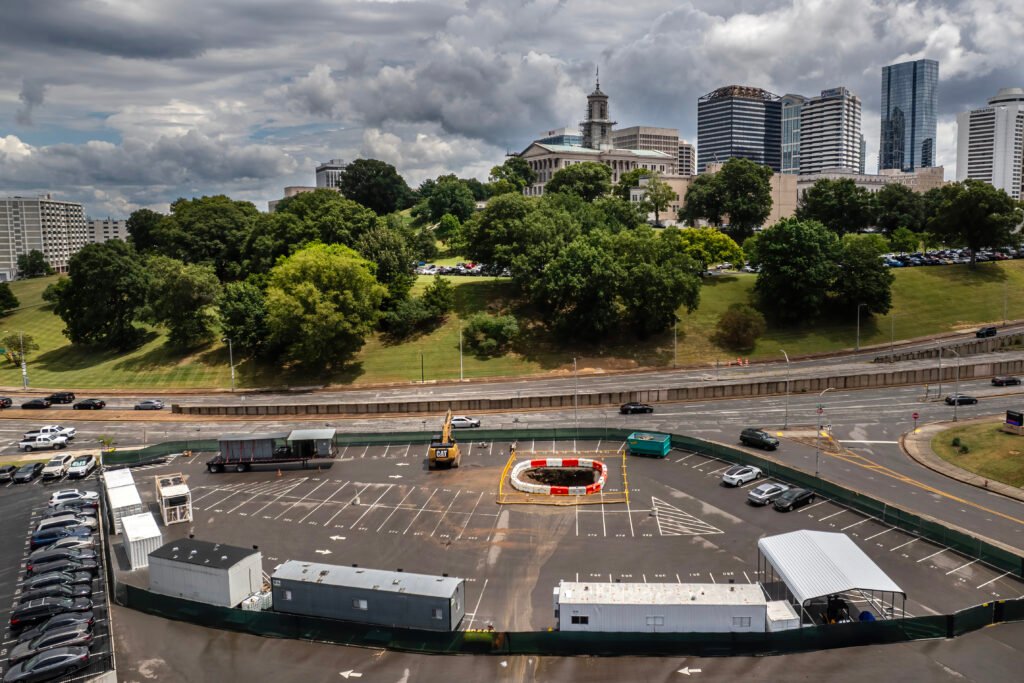The Music City Loop, an initiative by Elon Musk’s boring company, is taking shape in a state-owned parking lot near the Capitol. This project aims to create a tunnel linking Nashville International Airport to various points around the city for Tesla electric vehicles.
Republican Senator Mark Pody of Nashville has expressed that his initial fears regarding the tunnel project have been alleviated. He’s even looking to broaden the proposed tunnel routes, suggesting spaces like the East Coast of Donelson and the Music City Star Depot.
Pody, who serves as vice president of the Senate Transportation Committee and represents East Davidson County, mentioned that he met with state agencies and Musk’s team. “I’m fully invested in this. I’m quite comfortable with the direction it’s headed. I believe this could be beneficial for Tennessee,” he stated.
While ensuring that the tunnels won’t cause any environmental or utility complications, Pody expressed interest in extending the tunnels to areas like Hermitage/Donelson, where parking exists for the Music City Star train, which operates downtown. He envisions further connections extending to the East Coast, coinciding with significant state projects such as Titans Stadium and the Tennessee Performing Arts Center.
The boring company addressed over 70 questions from Nashville’s Mayor Freddie O’Connell’s office, promising to secure relevant Metro and state permits for the underground work, and emphasizing the importance of safety protocols and emergency measures.
The proposed loop relies heavily on private funding, with plans for tunnels designed to allow vehicles to navigate in both directions. Ongoing negotiations will determine the fees that the company will pay to the state or Metro.
O’Connell’s office is currently evaluating the company’s responses and is hoping for more detailed discussions about how the project might affect Nashville residents, as indicated by spokesman Julie Oaks Smith.
Despite these assurances and Pody’s support, Senator Heidi Campbell of Nashville remains opposed to the initiative. She criticized the process as “outrageous,” arguing that thorough impact studies have yet to be conducted.
Campbell contended that the views of Nashville residents seem overlooked, raising concerns about whether the project is indeed suitable for the area.
Earlier, the Executive Subcommittee of the State Construction Committee held a hearing where public comments were taken but not much deliberation took place before approving a non-cost lease of a national parking lot for tunnel drilling.
“This reflects a broader trend where governments seem to sidestep the democratic process, which is quite alarming to me,” Campbell remarked.
She further criticized the state’s predisposition towards supporting large corporations rather than prioritizing public interest.
The state intends to sign a long-term lease for the occupation and operation of the tunnel, with processes requiring federal highway approvals, per Department of Transportation spokesperson Beth Emmons.
The boring company plans to apply for a permit from the Department of Transportation, which will be reviewed based on the project’s specifics, Emmons mentioned.
“Since this is our inaugural project, we anticipate that this request will necessitate additional information and stipulations from the permitting authorities to ensure all interests are safeguarded during construction,” Emmons added.
Metro’s Response
The boring company recently sent out numerous questions to which O’Connell’s office has responded.
- To ensure emergency vehicle access during and after construction, the tunnel is being designed to meet national transport standards with exit spacing of no more than 2,500 feet. Emergency vehicles will share the same portal as the Tesla vehicles.
- The Music City Loop will adhere to safety regulations, having engaged with state firefighters and the Nashville Fire Department, even inviting them to observe the Vegas Loop and its safety systems.
- There’s a “redundant” communication system in the tunnel for 911 calls, which ensures coordination between emergency service personnel and control centers, conforming to national safety requirements.
- Space is allocated for passengers and staff to safely exit vehicles in emergencies. Notably, the Vegas Loop Tunnel maintains a gap of nearly three feet between vehicle side mirrors and the tunnel walls.
- In fire scenarios involving Tesla batteries, a ventilation system is designed to direct smoke and hazardous gases outside.
- Access points feature secure gates, monitored entrance stations, and comprehensive camera coverage to maintain safety; unauthorized entry triggers immediate alerts and lights.
- Similar to the Vegas Loop, Music City Loop employs gaskets to seal joints and utilizes a grout sealant to prevent water ingress, with high-capacity pumps in place for drainage.
- Insurance for the project meets and exceeds required standards, and the company is accountable for any injuries arising from its operations.
- The long-term ownership of the tunnel will be publicly accessible once finalized.
- Maintenance costs will be privately funded, per the state lease terms.
- The project has undergone utility assessments to avoid conflicts, with the company covering costs associated with relocations and adhering to authorization protocols.







